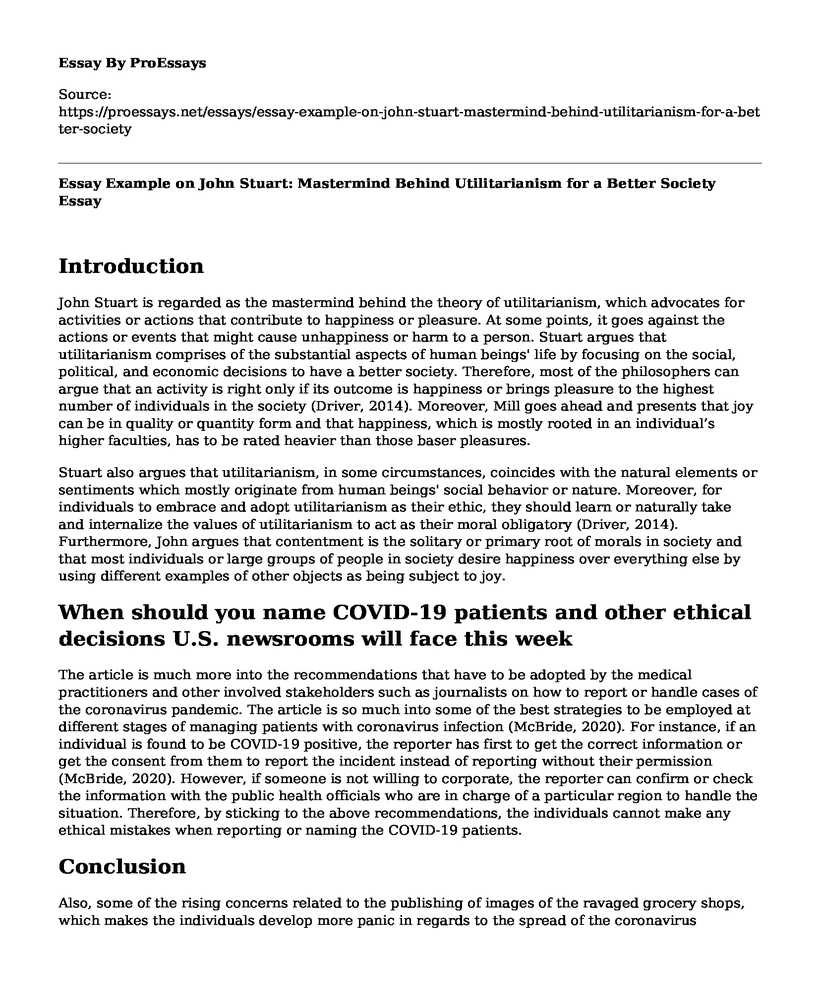Introduction
John Stuart is regarded as the mastermind behind the theory of utilitarianism, which advocates for activities or actions that contribute to happiness or pleasure. At some points, it goes against the actions or events that might cause unhappiness or harm to a person. Stuart argues that utilitarianism comprises of the substantial aspects of human beings' life by focusing on the social, political, and economic decisions to have a better society. Therefore, most of the philosophers can argue that an activity is right only if its outcome is happiness or brings pleasure to the highest number of individuals in the society (Driver, 2014). Moreover, Mill goes ahead and presents that joy can be in quality or quantity form and that happiness, which is mostly rooted in an individual’s higher faculties, has to be rated heavier than those baser pleasures.
Stuart also argues that utilitarianism, in some circumstances, coincides with the natural elements or sentiments which mostly originate from human beings' social behavior or nature. Moreover, for individuals to embrace and adopt utilitarianism as their ethic, they should learn or naturally take and internalize the values of utilitarianism to act as their moral obligatory (Driver, 2014). Furthermore, John argues that contentment is the solitary or primary root of morals in society and that most individuals or large groups of people in society desire happiness over everything else by using different examples of other objects as being subject to joy.
When should you name COVID-19 patients and other ethical decisions U.S. newsrooms will face this week
The article is much more into the recommendations that have to be adopted by the medical practitioners and other involved stakeholders such as journalists on how to report or handle cases of the coronavirus pandemic. The article is so much into some of the best strategies to be employed at different stages of managing patients with coronavirus infection (McBride, 2020). For instance, if an individual is found to be COVID-19 positive, the reporter has first to get the correct information or get the consent from them to report the incident instead of reporting without their permission (McBride, 2020). However, if someone is not willing to corporate, the reporter can confirm or check the information with the public health officials who are in charge of a particular region to handle the situation. Therefore, by sticking to the above recommendations, the individuals cannot make any ethical mistakes when reporting or naming the COVID-19 patients.
Conclusion
Also, some of the rising concerns related to the publishing of images of the ravaged grocery shops, which makes the individuals develop more panic in regards to the spread of the coronavirus infection around the United States and other parts of the world. For instance, the most recommended photos to upload are the shelves that are clean with some food items so that the news consumers cannot start panicking due to fear or food supplies in their region in the future because of the pandemic. Through the editing of the images, the audience or news consumers can have less tension and be able to manage their supplies efficiently and avoid running out of stock in the future since the pandemic seizure is not well known.
Questions
- What are some of the essential characteristics of utilitarianism?
- What principles does utilitarianism depend on when presenting their arguments?
- How can societies live healthily with the COVID-19 outbreak?
References
Driver, Julia, "The History of Utilitarianism", The Stanford Encyclopedia of Philosophy (Winter 2014 Edition), Edward N. Zalta (ed.), URL = https://plato.stanford.edu/entries/utilitarianism-history/
McBride, K. (2020). When should you name COVID-19 patients and other ethical decisions U.S. newsrooms will face this week - Poynter. Poynter. Retrieved 17 June 2020, from https://www.poynter.org/ethics-trust/2020/when-should-you-name-covid-19-patients-and-other-ethical-decisions-u-s-newsrooms-will-face-this-week/.
Cite this page
Essay Example on John Stuart: Mastermind Behind Utilitarianism for a Better Society. (2023, Sep 04). Retrieved from https://proessays.net/essays/essay-example-on-john-stuart-mastermind-behind-utilitarianism-for-a-better-society
If you are the original author of this essay and no longer wish to have it published on the ProEssays website, please click below to request its removal:
- Essay Sample on Morality of Capitalism
- Expository Essay: The Elderly
- Code of Conduct and Managing Business Information Paper Example
- The Danger of a Single Story Paper Example
- Essay Example on Comparing Plato's Cave to The Matrix: Reality and Perception
- Personal Values Essay Example
- Reimagining Aladdin: Cultural Depictions, Character Transformations, and the American Dream in Animation - Free Essay







